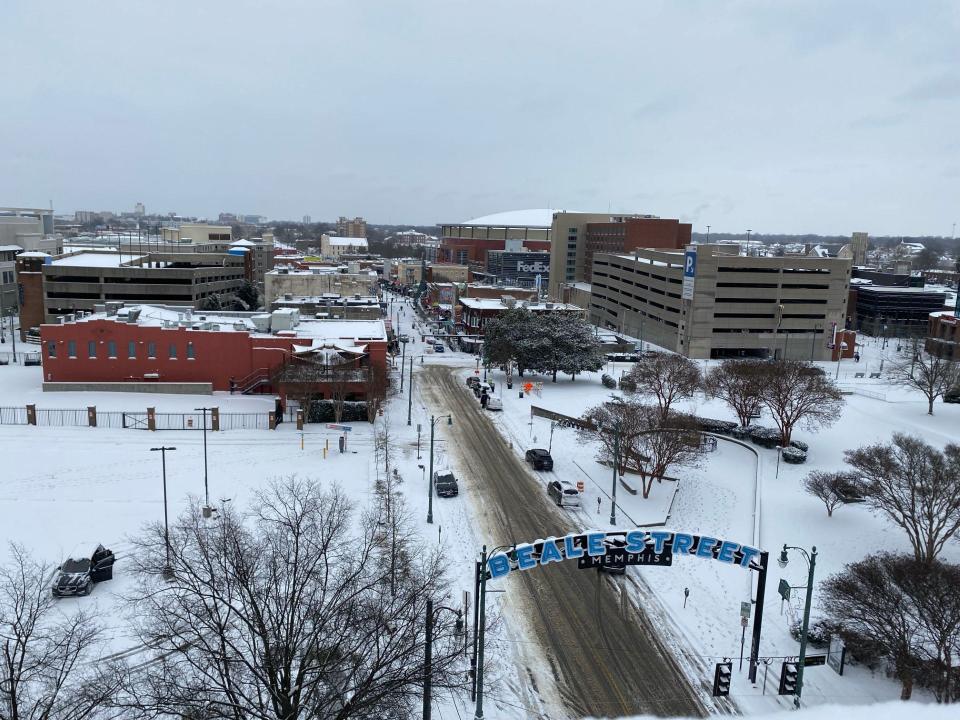What is Memphis doing about potholes? (It's fixed 22,000+ so far in 2024) | Know Your 901
What do you want to know about Memphis?
Know Your 901 is an initiative launched by the know-it-alls at The Commercial Appeal that will seek to answer your questions about the Bluff City and the Greater Memphis region.
Readers, we want your queries and your input! All subject matter is welcome: Culture, art, history, geography, celebrity, TV, music, food, and et cetera. Send questions to knowyour901@commercialappeal.com and we will try to give you an answer in a future column.
Today's column asks:
What is Memphis doing about potholes?

"Fasten your seat belts, it's going to be a bumpy night," screen diva Bette Davis famously sneered in "All About Eve."
If she'd been behind the wheel of an automobile during a nocturnal drive in Memphis, she may not have been speaking strictly metaphorically.
On certain streets on certain days, potholes can make for bumpy nights, afternoons and mornings alike.
Judging from social media chatter and idle conversation, motorists now seem almost as dismayed by the condition of the thoroughfares they traverse as by the dubious decisions of the road hogs, stop sign scofflaws, turn signal amnesiacs and aspirational demolition derbyists who have made the category "Memphis driver" a synonym for "inattentive" and "reckless," at least in the popular Bluff City imagination.
But while some Memphis drivers are dodging potholes, others are trying to find them.
As if they were players in a 321-square-mile game of Whac-A-Mole, many maintenance crews of the Memphis Public Works Division spend their days in the endless pursuit of potholes, filling the cavities, craters and cracks that pit the city's streets.
The job is so unending, the task so Sisyphean that the city for decades has operated its own asphalt plant on Sledge Avenue, producing what Public Works Director Robert Knecht calls the "hot mix asphalt" used by workers on "pothole duty" to plug the gaps in our streets. “We use so much asphalt," Knecht said, "we can make it more cost effectively than if we were paying a premium price to some private company."

According to Knecht, the city maintains 6,714 "lane miles" of street within the 321 square miles of Memphis.
Essentially, a lane mile is a road mile multiplied by the number of lanes in the road. For example, one mile of four-lane road would equal four lane miles. So maintaining Memphis roads is a formidable task.
"If you think about 6,700 lane miles," Knecht said, "that's from New York to Los Angeles and back, if you were to lay it all out."
Meanwhile, the Tennessee Department of Transportation has charge of another 943 lane miles of state routes and interstate within the city. The state's responsibilities include such major streets as State Route 57, better known in Memphis as Poplar Avenue, and State Route 1, aka Summer.
The city's longest-serving division director, Knecht knows potholes. "I have a lot of experience with potholes," he said.
He said the city the past few years has paved roads and filled holes at a steadier pace than ever before. This accelerated response is necessary because of a couple of factors.
First, the swings in temperature and the unusual weather conditions that have been prevalent recently — remember January's snowy deep freeze? — are damaging to roadways. "Freeze-thaw cycles are hard on older asphalt surfaces," Knecht said. "Ice finds those little fractures. When something freezes it expands, and then when it melts it contracts."

Also stressful is the growing presence of increasingly heavy trucks. Loaded freight trucks that weigh tens of thousands of pounds are now common.
The result: more potholes.
According to Knecht, the Public Works division filled 22,514 potholes between Jan. 1 and Feb. 27. This pace puts 2024 on course to finish ahead of the statistical average for Memphis, which typically fills about 50,000 potholes per year.
Knecht said the division assigns about 40 to 50 workers to "pothole duty" per day. Crews are assigned to specific geographic areas, based on a gridded city map, and they begin each day with lists of potholes that need to be filled within their grids, as reported by citizens. "Their goal is to get those service requests done," Knecht said. "It's systematic." However, in their travels, "they're not supposed to overlook a pothole." So if, on their journey from Pothole A to Pothole B, they happen upon an unreported crater, they are supposed to also repair this unexpected Pothole C.
"We typically respond within three days," Knecht said. He said potholes that are around much longer than five days that probably have not been reported.
In addition to manpower, the Public Works division is applying high-tech solutions, what Knecht calls "the innovative, cutting-edge deployment of technology," to this ancient problem.
The city has partnered with the location-computing company Google Cloud and the data analytics company SpringML (which stands for "Machine Learning") to develop a "pothole detection" system that uses digital technology and artificial intelligence applications to identify and map potholes. Using this system, vehicles equipped with video cameras identify problem areas as they cruise along roadways, providing the city with what might be called definitive pothole intel, to speed up response time and reduce reliance on pothole phone calls from citizens.
So far, the city has two vehicles outfitted to carry out these sweeps, on an intermittent basis. One is an SUV, the other a streetsweeper, which identifies potholes even as it cleans streets.
A street maintenance innovator, Knecht said his "vision" is to deploy a fleet of such vehicles, and to share the technology with road departments in other cities and states.
"This is more for the good of all mankind," said Knecht, sounding more like Neil Armstrong stepping onto the powdery surface of the Sea of Tranquility than like a public official mapping pock marks on the streets of Memphis. "This is what we do. We're here to benefit citizens."
How to report potholes in Memphis
People who wish to report potholes to the city should call (901) 636-6500 or visit memphistn.gov/street-maintenance for more information. For state maintenance requests, call (833) 836-8349 or visit tn.gov/tdot/maintenance.
This article originally appeared on Memphis Commercial Appeal: Potholes in Memphis: How city is fixing roads and how to report issues

